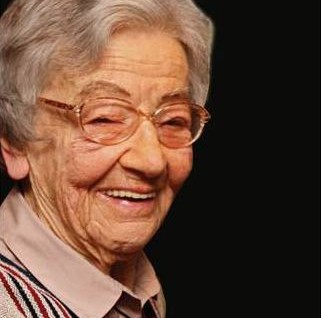“Feminism isn’t an employment agency for women; it’s an alternative way of ordering the social space, in which women are the prototype rather than men. It is based on collaboration rather than competition. As a youngster, I still remember my feeling of joy that one could look at the earth differently. That’s feminism; everything is differently oriented. Seeing the same world with different eyes.” — Ursula Franklin
This quote from Ursula Franklin introduces the chapter on the 1970s in my oral history of the women’s movement. It most perfectly expressed the idealism of early second wave feminism and Ursula Franklin herself, who lived her life according to these principles until her death at the age of 94 on Friday.
Most of the tributes to Ursula have focused on her pioneer work as a scientist but I knew her as a feminist pioneer. My strongest memory of her is of a panel we were both on about 10 years ago. A young woman in the audience asked us, “What do you think is the most important characteristic of a feminist activist?” “Passion,” I answered. “Passion is good,” she responded in that quavering but powerful voice, “but compassion, compassion is more important.” And she was right.
The last time I saw her a couple of years ago when I ran into her on a street in my neighbourhood, she said, “I don’t recommend old age Judy. It’s very time consuming.” And we both had a good laugh. But even in old age she managed to find the time to be as brilliant, incisive and compassionate as she ever was.
Ursula was a Quaker and a founding member of the Voice of Women, a feminist peace group started in 1960 and continuing until today.
In Ten Thousand Roses she told me about how brave VOW was in those early days when they believed contact between women could counter in impact of the Cold War
“Voice of Women invited Soviet women to come to Canada and talk about early childhood education in ’62 or ’63. We had to raise all the money and it took great courage from both the Soviet women and the Canadian women. When the Soviet women arrived, they were naturally apprehensive. I noticed one had a cold, so I grabbed my handbag and gave her some vitamin C, and she smiled with relief. Now what man would do that to break down the barriers? That commonality is also part of feminism.”
While the women’s liberation movement that came later would reject some of these ideas of women’s nature as different from men, the risks that Voice of Women took in action prefigured the work of the women’s movement that followed.
“Protesting the Pearson government on nuclear arms lost Voice members. And we lost members by bringing in the Soviet women. These actions in the full knowledge that they were difficult and controversial…But it was an enormous contribution to the liberation of women to show women on the practical level that you could take these risks and survive.”
One of the most extraordinary initiatves of the Voice of Women was the collection of baby teeth. Using their base of mostly mothers to collect baby teeth, Ursula took those teeth and showed that they contained high levels of Strontium 90 thus convincing President John F. Kennedy to stop the testing. It was an amazing victory for those times and at the same time pioneered combining the work of academics with social activism, which became a hallmark of Canadian feminism.
She was always up with the times too. In an interview with the CBC in 2010, she elaborated on her most famous quote:
“I define peace not as the absence of war, but as the presence of justice and the absence of fear. There’s peace when people don’t have to be afraid. And people don’t have to be afraid when there is genuine justice.”
How we will miss her.



